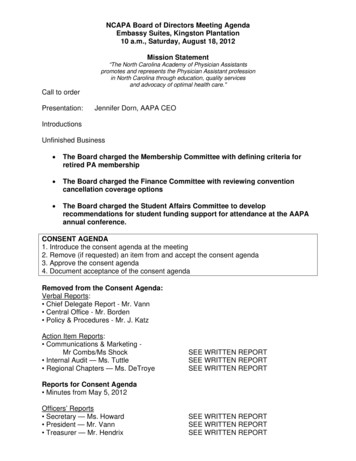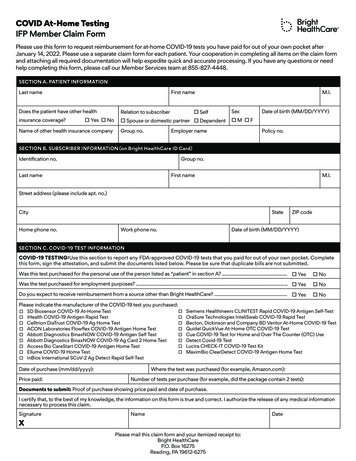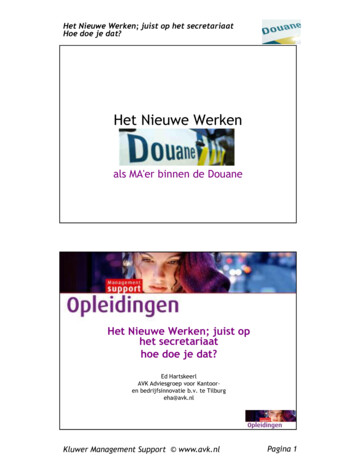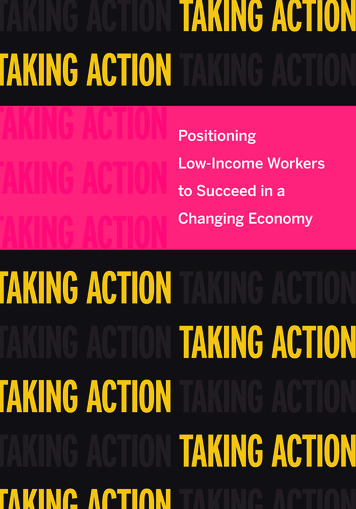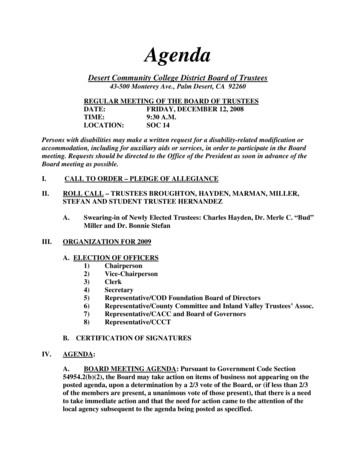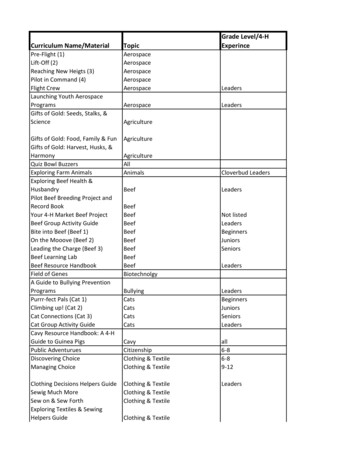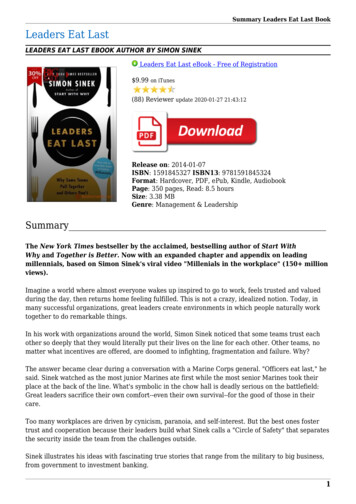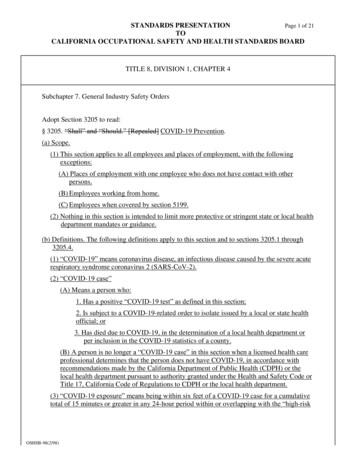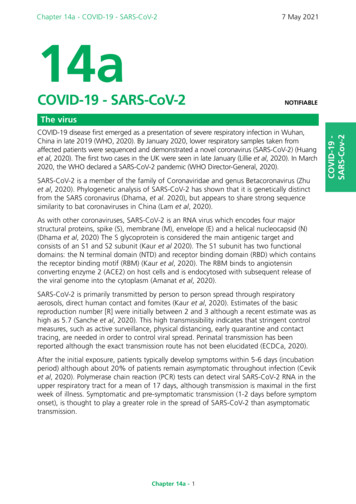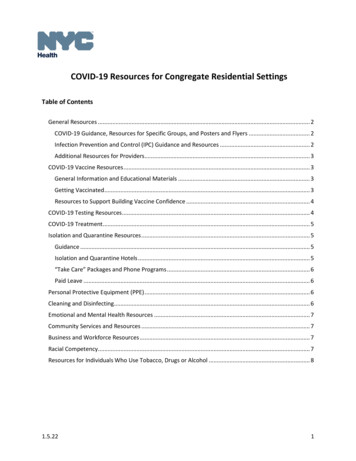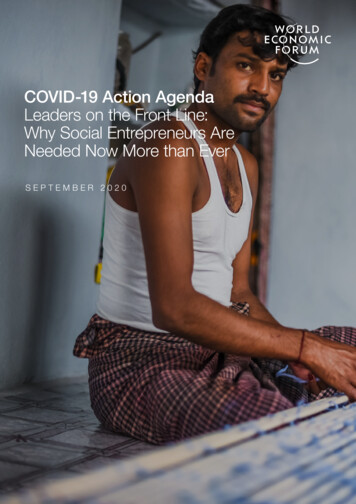
Transcription
COVID-19 Action AgendaLeaders on the Front Line:Why Social Entrepreneurs AreNeeded Now More than EverSEPTEMBER 2020
COVID-19 ACTION AGENDASEPTEMBER 2020World Economic Forum 91-93 route de la CapiteCH-1223 Cologny/Geneva SwitzerlandTel.: 41 (0)22 869 1212 Fax: 41 (0)22 786 2744Email: contact@weforum.org www.weforum.org September 2020 World Economic Forum. All rightsreserved. No part of this publication may be reproducedor transmitted in any form or by any means, includingphotocopying and recording, or by any information storageand retrieval system.
Cover: Yunus Social Business, India, Akhil PawarCOVID-19 ACTION AGENDASEPTEMBER 2020Contents5Foreword8Executive summary10Chapter 1 COVID-19: A global crisis, hitting the most vulnerable the hardest14Chapter 2 Why social entrepreneurs are needed now more than ever18Chapter 3 What social entrepreneurs need to play their part25Chapter 4 COVID-19 Social Enterprise Action Agenda284.1 Supporting intermediaries304.2 (Impact) investors324.3 Corporations344.4 Funders and philanthropists364.5 Government institutions39Chapter 5 The road ahead41Appendix 1 Who are social entrepreneurs?42Appendix 2 About the COVID Response Alliance for Social Entrepreneurs45Alliance member profiles68Acknowledgements69EndnotesCOVID-19 Action Agenda Leaders on the Front Line3
COVID-19 ACTION AGENDASEPTEMBER 2020“We call on all actorsto stand by socialentrepreneurs as frontline responders to theCOVID-19 crisis andas pioneers of a green,inclusive society andeconomic system.”Members of the COVID Alliancefor Social EntrepreneursAavishkaar Group, Acumen, Africa Venture Philanthropy Alliance (AVPA), Agora Partnerships,Argidius Foundation, Ashoka, Asian Venture Philanthropy Network (AVPN), Aspen Networkof Development Entrepreneurs (ANDE), B Lab, CASE at Duke University, Catalyst 2030,Co-Impact, DOEN Foundation, Draper Richards Kaplan Foundation, Echoing Green, EuclidNetwork, European Venture Philanthropy Association (EVPA), Fundación Avina, GHRFoundation, Global Impact Investing Network (GIIN), Global Innovation Fund, Global SteeringGroup for Impact Investing (GSG), Greenwood Place, IIX, IKEA Foundation, IKEA SocialEntrepreneurship, Impact Assets, Impact Hub, International Labour Organization, Johnson& Johnson, KIVA, Latimpacto, Lex Mundi Pro Bono Foundation, Mercy Corps Ventures,Motsepe Foundation, NESsT, Nonprofit Finance Fund (NFF), Open Road Alliance, Rippleworks,Root Capital, Salesforce.org, SAP, Schwab Foundation, Shell Foundation, Skoll Foundation,Sorenson Impact Foundation, Thomson Reuters Foundation, UNDP Business Call to Action,UNDP SDG Impact, United States African Development Foundation (USADF), USAID Center forInnovation and Impact (CII), Village Capital, Yunus Social Business, 60 DecibelsCOVID-19 Action Agenda Leaders on the Front Line4
COVID-19 ACTION AGENDASEPTEMBER 2020Hilde SchwabForeword“Everything we do during and afterthis crisis must be with a strong focuson building more equal, inclusive andsustainable economies and societiesthat are more resilient in the face ofpandemics, climate change and the manyother global challenges we face.”Chairperson, SchwabFoundation for SocialEntrepreneurshipFrançois BonniciHead, Schwab Foundationfor Social EntrepreneurshipWhen UN Secretary-General António Guterres spokeof the effects of the crisis and what it meant for theefforts of change-makers all over the world to builda better world, it was clear that today’s systems arenot shockproof or able to manage the immediateand long-term consequences of the pandemic.One by one, countries have gone into lockdown,people are withdrawing into their homes and circles,and vulnerable and marginalized communities arebeing hit the hardest: those living in poverty, withoutthe security of a job or furlough scheme when jobsdisappear, migrants or the homeless – the list goeson. The World Bank estimates that over 420 millionadditional people will be pushed into poverty, writingoff all the gains made to alleviate poverty since 2016.These communities need global solidarity urgently.their employees, and the families whose lives theytouch. They were able to bring affordable healthcareto those in need, protect thousands of jobs andprovide emergency relief swiftly.For social entrepreneurs to lead, however, theyneed each of us – funders, investors, corporations,supporting intermediaries and governments alike –to connect them with capital and support to adapt,continue and expand their work.The COVID Response Alliance for SocialEntrepreneurs is collaborating with 60 leadingsocial-change organizations towards a commongoal: to support social entrepreneurs whoprotect the most vulnerable in this crisis andshape the transition to a new normal in itsaftermath.The support of the Schwab Foundation and itspartners, the GHR Foundation, Yunus SocialBusiness, Duke University and Catalyst 2030,enabled the Alliance members to understand theneeds of social entrepreneurs during the COVIDcrisis, coordinate and amplify their respectivesupport efforts, and collectively outline an ActionAgenda towards this goal.At the Schwab Foundation for SocialEntrepreneurship, we have worked for the pasttwo decades to help social innovators andentrepreneurs build and scale their important workto find alternatives to our systemic failures andinequalities. Now more than ever, we need theseleaders – not only to help provide the immediateassistance to the vulnerable, but also to inspire a“reset” of our society that is failing so many today.By means of this COVID-19 Action Agenda,members of the Alliance invite their peers,businesses and governments, to join them in action.The Action Agenda builds on the commitmentsand actions that our members have already takenand seeks to both inspire and provide practicalguidance on the “why”, “what” and “how” of therecommendations included in this document.In March of this year, when the scale of theCOVID-19 pandemic became apparent, socialentrepreneurs across the world – including manyin our Schwab Foundation community – werequick to stand by their communities and clients,Unprecedented times call for unprecedented actions.We urge you to join us and other members of theAlliance to take bold and immediate action. The timeto get behind our social entrepreneurs, many of whomare working on the front line of the crisis, is now.COVID-19 Action Agenda Leaders on the Front Line5
COVID-19 ACTION AGENDASEPTEMBER 2020Raj PanjabiChief Executive Officer,Last Mile Health, USAMuhammad YunusChairman, YunusCentre, Bangladesh;Chairman, Yunus SocialBusiness, Germany;Nobel Peace PrizeLaureate (2006)Achim SteinerAdministrator, UnitedNations DevelopmentProgramme (UNDP),New YorkJon AbrahamssonRingChief Executive Officer,Inter IKEA Group,NetherlandsAmy GoldmanChief Executive Officerand Chair, GHRFoundation, USA“Social entrepreneurs play a criticalrole in serving the most marginalizedmembers of our global society. Theirwork has never been more importantas we respond to COVID-19. We callon leaders across the public, privateand social sectors to invest in these firstresponders now.”“Before COVID-19 struck, the globaleconomy was like a high-speed trainheading for self-destruction. Thepandemic has stopped the train andgiven us an opportunity to redirect thetracks with social businesses in the lead.”“To achieve the SDGs and shapea new tomorrow from the globalpandemic, we must scale upsustainable solutions. Socialentrepreneurs are critical to achievingthe SDGs as they offer financially selfsustaining models for positive socialand environmental change.”“Now, more than ever, we need tocome together to lay the groundworkfor an inclusive recovery. We arecommitted to standing by our differentpartners, including social entrepreneurs.This is a critical way for us to contribute,learn, innovate and scale for positiveimpact on people, the planet andsociety. We are in this together.”“This pandemic reminds us that ourdifferences in faith, culture or politicsare superseded by what we havein common. Whether someone is asocial entrepreneur or a member ofa faith community or both at once,we all share a deep desire to alleviatesuffering, support human dignity andhelp people build a better future. ThisAlliance is going to help people doexactly that.”COVID-19 Action Agenda Leaders on the Front Line6
COVID-19 ACTION AGENDASEPTEMBER 2020Janet LongmoreFounder and ChiefExecutive Officer,Digital OpportunityTrust (Catalyst 2030and Schwab SocialEntrepreneur)Cheryl DorseyFounder and President,Echoing Green, USAMichael SneedExecutive VicePresident, GlobalCorporate Affairs, andChief CommunicationOfficer, Johnson &Johnson, USAPreciousMoloi-MotsepeFounder and ChiefExecutive Officer,African FashionInternational (AFI),South AfricaHilde SchwabCo-Founder andChairperson, SchwabFoundation for SocialEntrepreneurship“The pandemic is having a devastatingimpact on the planet and its citizens,particularly on those who aremarginalized. We must come out ofthis with a transformative change thataddresses our critically flawed socialand economic systems and is drivenby the experience, principles andmindset of the social entrepreneur.”“As the pandemic disproportionatelyimpacts marginalized communities inreal time, social entrepreneurs confrontthese inequities by reimagining thesystems that work for too few of us. Byjoining forces to foster change using analliance-based model, we have a realchance of transforming the world.”“The COVID-19 crisis only strengthensour resolve at Johnson & Johnson tosupport social entrepreneurs leadingthe changes so urgently needed toput good health in reach of everyone,everywhere. We stand with our partnersaround the world to act swiftly nowmore than ever.”“The outbreak of COVID-19, and thesubsequent lockdown restrictionsimposed, have resulted in significantalterations to the livelihoods ofAfrica’s most vulnerable people. Wecan only reach the other side of thiscrisis if we collaborate, and take onthis fight together.”“Social entrepreneurs are battlingat the forefront of this pandemicusing their ingenuity to confront theproblems on the ground. The Alliancewas launched to help them to playtheir part and be the role models for anew societal reality that they are.”COVID-19 Action Agenda Leaders on the Front Line7
COVID-19 ACTION AGENDASEPTEMBER 2020Executive summaryWhile some countries are already addressing theaftermath of their COVID-19 outbreak, the WorldHealth Organization projects that the worst isyet to come in many developing and emergingcountries, with the global pandemic expected tolast at least another year.As of August 2020, over 20 million cases ofCOVID-19 have been reported, of which onethird are in Africa, Brazil and India. Marginalizedcommunities worldwide are being hit the hardestby the health and economic effects of thiscrisis and will thus continue to struggle. Thepandemic has a much greater impact on thesecommunities: an additional 100 million1 peoplecould slip into extreme poverty – a number thatcould easily climb higher. Decades of work totackle impoverishment are being erased as theworld witnesses a rise in global poverty for thefirst time since 1998.With citizens and decision-makers shifting theirattention to the immediate effects of the crisis,and with a global recession looming, the futureof people and the planet, embodied by theSustainable Development Goals (SDGs) and theSustainable Development Agenda, is at risk ofpermanently falling behind.For decades, social entrepreneurs have effectivelyreached and helped vulnerable populations andhave served as the guardians of people and theplanet. Often and increasingly, they:1. Bring vital products and services to thoseon the fringes of society, while acting as firstresponders during a crisis2. Sustain jobs and social security, at a timewhen the effects of losing one’s income can beparticularly devastating3. Innovate to address the intractable social andenvironmental challenges society faces4. Champion the sustainable development agenda,calling for an inclusive and green economy anda reset of markets5. Empower and create agency amongcommunities so they can develop and advancetheir own trajectories and solutions.The social entrepreneurs’ track record and ingenuityto confront immediate problems on the ground arevital to the collective ability to weather the crisistoday and shape a new tomorrow.COVID-19 Action Agenda Leaders on the Front Line8
COVID-19 ACTION AGENDASEPTEMBER 2020Yet, for social entrepreneurs to play their part,significant capital as well as non-financial supportare needed; many face important operationaland viability challenges, with a large number evenfacing bankruptcy. In this area also, those socialentrepreneurs serving or working with low-incomehouseholds seem to be disproportionately affected.For social entrepreneurship to survive and thrive,these entrepreneurs critically need capital support sothat they can adapt, expand and protect their impactduring the COVID-19 pandemic and its aftermath. Theexact amount of capital needed is difficult to estimate,but it is significant. According to the multistakeholderinitiative Collaborative for Frontier Finance, before theCOVID-19 crisis, the global financing needs of smalland growing businesses (SGBs), which include socialentrepreneurs, amounted to 930 billion with theSDG financing gap estimated at 2.5 trillion. There islittle doubt that these already considerable gaps havewidened significantly due to the crisis.The COVID Response Alliance for SocialEntrepreneurs was launched in April 2020 by 60leading social-sector organizations aiming to helpmobilize support and raise awareness of the vital rolethese entrepreneurs play in tackling the crisis andbeyond. In various capacities, the members of theAlliance support over 50,0002 social entrepreneursacross the world. The entrepreneurs, in turn, have adirect or indirect impact on the lives of nearly 1 billionpeople according to their own estimates‚ providingaccess to employment, food, affordable energy andother critical services.In this COVID-19 Action Agenda for socialentrepreneurs, members of the Alliance committo and call on their peers to stand by socialentrepreneurs in their capacity as front-lineresponders to the health crisis and as pioneers ofa green, inclusive society and economic system.Along with a group of social enterprise representativesparticipating in the Alliance, the members haveidentified five core COVID response principles andconcrete areas in which different actors can take action.The five COVID-19 response principles for thoseseeking to support social entrepreneurs are to:Keeping these principles in mind, the COVID-19Action Agenda calls on:–– Intermediaries and networks to providefitting support to social entrepreneurs and thecommunities they serve, and to make knownthe needs and priorities of social entrepreneurson the ground–– (Impact) investors to adapt their investmentpriorities and processes, and to provideflexible capital as well as must-have technicalassistance–– Corporations to stand with socialentrepreneurs within their supply chains andthe broader ecosystem, fulfil their agreementsand extend their support to build a moreinclusive and resilient economy–– Funders and philanthropists to expand andexpedite their support to social entrepreneursand intermediaries, taking risks reflective oftoday’s unprecedented times–– Government institutions to recognize socialentrepreneurs as a driving force in safeguardingjobs and in pioneering a greener and equitablesociety, as well as to back them accordingly.The COVID-19 crisis will continue todisproportionately affect excluded and vulnerablepopulations negatively for years to come. Allsectors’ help is needed to create the enablingconditions for the social enterprise ecosystem tosurvive, thrive and hold everyone accountable toraise the bar on what is currently an economicmodel that our planet cannot sustain.The members of the COVID Response Alliancefor Social Entrepreneurs will continue to take andinvite engagement in each of the action areasmentioned in this Action Agenda. Leading up tothe World Economic Forum Annual Meeting 2021,the goal is not only to help safeguard the future ofsocial entrepreneurs but to inject their perspectivesas pioneers of a new economic reality into theForum’s Great Reset initiative.1. Make the voices of social entrepreneurs and theircommunities heard2. Prepare to respond, recover and reset – takingthe opportunity to shape a new tomorrow3. Collaborate across sectors in recognition of thecomplexity and scale of the crisis4. Look beyond healthcare, given that COVID-19touches all areas of people’s lives5. Support the shovel-ready solutions thatgrassroots organizations are already able toprovide today.COVID-19 Action Agenda Leaders on the Front Line9
COVID-19 ACTION AGENDASEPTEMBER 2020CHAPTER 011Below: Kids’ Educational Engagement Project(KEEP), Social enterprise in Liberia, supportedby Alliance Member AcumenCOVID-19: A globalcrisis, hitting themost vulnerablethe hardestCOVID-19 Action Agenda Leaders on the Front Line10
COVID-19 ACTION AGENDASEPTEMBER 2020CHAPTER 01In the first six months of 2020, COVID-19 affectedalmost all countries and over 20 million peoplearound the world.3 Beyond the adverse healtheffects and human tragedy caused by the virus, it iswidely recognized that the pandemic has triggeredthe most severe economic crisis in a century.The crisis has brought about radical uncertainty,with more than half of the world’s populationexperiencing lockdowns with strong containmentmeasures. The Organisation for Economic Cooperation and Development (OECD) predicts globaleconomic activity to fall between 6% and 7.6%in 2020,4 depending on whether a second waveof infections hits before year-end. Unemploymentlevels and the number of aid seekers haveincreased, in some cases dramatically. And theimpact of the crisis will be felt for a long time asthe direct response, subsequent recovery andrebuilding efforts will take years.The impact of the crisis on people’s lives isdrastically uneven. The virus has exposedand exacerbated many underlying structuralinequalities in the social fabric, disproportionatelyaffecting women, black populations,minority groups, informal workers and thosesystematically excluded from participating equallyin our society and economy.Lockdowns in their varying degrees of severityand other forms of social distancing have made itpossible to avoid loss of life. Yet these measureshave also come at a human cost.As the crisis continues to accelerate in emergingand developing markets, many of whichare ill-equipped to handle a pandemic, theextreme impacts of COVID-19 on low-incomepopulations are significant. The poorest in thesecountries, including daily-wage labourers andmigrant workers – rural and urban – lack accessto even the most basic necessities like foodand water, and are forced to choose betweentheir health and their livelihoods. The toughchoices these populations are forced to makelead to additional distress. COVID-19 is causingan undeniable slide backwards, slipping awayfrom the SDGs. In June 2020, the World Bankprojected that as many as 100 million additionalpeople could be forced into extreme poverty –living below 1.90 per day – due to COVID-19.5Undeniably, global extreme poverty is increasingfor the first time since 1998.For each of us, but most importantly for thesecommunities, a comprehensive and sustainedresponse to the crisis and its aftermath is a matterof life and death.Respond, Recover,Rebuild – ResetAs COVID hit the world,experts recognized threephases in the crisis: response,recovery and, ultimately,rebuilding. Throughout, thereis an opportunity for a GreatReset of our economies andsystems.RESPOND(0-12 months)RECOVER(6-18 months)REBUILD & RESET(12 months)COVID-19 Action Agenda Leaders on the Front Line11
FIGURE 1Foremost COVID-19 concerns among low-income householdsTo better understand the impact of COVID-19, Alliancemember 60 Decibels conducted over 15,000 phoneinterviews in low- and middle-income countriesacross Asia, Africa and Latin America. The goal wasto gather information from low-income households onSource: 60 Decibels,“Listening in the time ofCovid-19: Explore theinsights”, 15 August e effects of COVID-19 on their lives and to identifytheir most urgent needs and concerns. Tracking howthe pandemic affects these households over time, 60Decibels discovered jarring facts on how the lives ofthe poorest have been affected by COVID-19.Primary concernQ: What is the primary concern you have related to COVID-19 right now?0My health or my family’s health49%Ability to work / earn an income29%The economy8%Acces to basic needs8%Other4%Childcare1%10To understand national and community-levelvulnerabilities, the organization developed aVulnerability Index, evaluating who is hardest hitby the pandemic. The Index takes into accountsuch factors as respondents’ food consumptionand financial well-being, and their likelihood ofliving or slipping into poverty. Insights from theIndex revealed that female-headed householdsSource: 60 Decibels,“Listening in the time ofCovid-19: Explore theinsights”, 15 August 04050face higher levels of risk and vulnerability thanmale-headed households (40% vs 25% forhouseholds headed by men), confirming theworldwide perception that the crisis actuallydeepened existing structural inequalities.Other stories show similar social fault lines; forexample, black business owners have been hitharder than other owners.Vulnerability by countrySierra Leone29%Rwanda28%UgandaNigeria10%Myanmar6%Côte d’Ivoire5%Tanzania3%12%14%15%Extremely vulnerable18%21%18%23%23%31%38%24%30%30%Very Slightly vulnerableCopingCOVID-19 Action Agenda Leaders on the Front Line12
COVID-19 ACTION AGENDASEPTEMBER 2020CHAPTER 01“Yes, we are now saving on every possible front and eating onlyas much as required. There is not a single rupee that is spentwithout thinking.”60 Decibels respondent, IndiaFIGURE 2The impact of COVID-19 on global extreme povertyNote: Extreme poverty ismeasured as the number ofpeople living on less than 1.90 per day.740720June downsideprojection700680June baselineprojection660640April 1202020192018201720165002015YMillions of people in extreme povertySource: Gerszon Mahler,Daniel, et al., “Updatedestimates of the impactof COVID-19 on globalpoverty”, World BankBlogs, 8 June 2020,available at atesimpact-covid-19-globalpoverty#: :text Under%20the%20baseline %20scenario%20we,comes %20with%20even%20more%20uncertainty.COVID-19 Action Agenda Leaders on the Front Line13
COVID-19 ACTION AGENDABelow: Yunus Social Business, India, Akhil PawarSEPTEMBER 2020CHAPTER 022Why socialentrepreneurs areneeded now morethan everCOVID-19 Action Agenda Leaders on the Front Line14
COVID-19 ACTION AGENDASEPTEMBER 2020CHAPTER 02Social entrepreneurs have been working to solvemarket failures and demonstrate more sustainablemodels to build inclusive economies for years.These entrepreneurs:1. Bring vital products and services to thoseon the fringes of society, while acting as firstresponders during a crisis2. Sustain jobs and social security, at a timewhen the effects of losing one’s income can beparticularly devastating3. Innovate to address the intractable social andenvironmental challenges society faces4. Champion the sustainable development agenda,calling for an inclusive and green economy anda reset of markets5. Empower and create agency amongcommunities so they can develop and advancetheir own trajectories and solutions.The Schwab Foundation 2020 report TwoDecades of Impact demonstrates how itsnetwork of 400 leading social innovators andentrepreneurs alone have improved the livesof more than 622 million people in over 190countries6 by protecting livelihoods, drivingmovements for social inclusion and environmentalsustainability, and providing improved access tohealth, sanitation, education and energy.When COVID-19 brought disarray to communitiesacross the world, social entrepreneurseverywhere instantly assumed first responderroles. From providing reliable information, servicesand care to the most vulnerable, to developingcommunity tracing initiatives or mental healthsupport through mobile phones, the work of thesocial entrepreneurs became even more criticalduring the pandemic.Over the last few months, notable stories ofsocial entrepreneurs who have gone above andbeyond their regular mandates have emerged.Many chose to maintain jobs through thepandemic despite their halting businesses, whilethose in a position to do so provided last-milesupport – for example by delivering essentials likemasks and sanitizers to those unable to affordthe bare minimum to keep themselves safe. Theirexisting relationships with low-income customersor beneficiaries and the trust they had built on theground positioned them well as early respondersto the pandemic.These entrepreneurs’ decades of societal R&D –and their tested shovel-ready solutions and modelsof running inclusive, sustainable organizations thatserve society – will be critical to the COVID-19response and recovery period.The need for social entrepreneurs is clearernow than ever before. They are a crucial socialsafety net for our systemic inequalities andmarket failures. The social entrepreneurs whoare “system change leaders” have an especiallyinvaluable role to play in triggering a resetof today’s markets and societies. They havemanaged to enable whole groups of society tobecome agents of their own change and haveeffectively managed to navigate the complexarrangements of institutions of power.Social entrepreneurs are uniquely positionedto represent a new yardstick for leaders in the21st century. Their knowledge, experienceand existing on-the-ground infrastructure canplay a vital role in revitalizing the sustainabledevelopment agenda and building moreinclusive, shockproof and resilient markets andsocieties.Yet, many social entrepreneurs face significant andimmediate operational and viability challenges andneed backing; significant capital and non-financialsupport is vital to put social entrepreneurs in aposition to effectively protect the most vulnerablein the crisis and help shape the transition to a newsocial and economic reality.“COVID-19 has exposed both the vulnerabilities facing lowincome communities and underlying power imbalances. Socialenterprises represent diverse local leaders needed for inclusivechange. We joined the Alliance to take action alongside others tosustain and champion these vital new voices.”Jacqueline Novogratz, Founder and Chief Executive Officer, Acumen, USACOVID-19 Action Agenda Leaders on the Front Line15
Stories from the front lineFIGURE 3Stories from the front line: Social entrepreneurs across the world responding to theCOVID-19 crisis and its aftermath01040506020103Family Independence Initiative USA Cash transfersTYPE Non-profit social enterpriseFOCUS Response and RecoverABOUT Founded in 2001, Family Independence Initiative (FII) provides families withdirect cash transfers, a digital platform and peer groups to accelerate the exchangeof financial and social capital in low-income communities across the USA. FII hascollaborated with over 250 community-based organizations to help families escapethe cycle of poverty.COVID RESPONSE Through the GiveTogetherNow campaign and the UpTogetherplatform, FII raised over 100 million and provided direct cash transfers to over100,000 low-income families who were struggling to make ends meet and to carefor their loved one.ALLIANCE MEMBER INVOLVED Schwab Foundation for Social Entrepreneurship02Instituto Muda Brazil JobcreationTYPE For-profit social enterpriseFOCUS Response and ResetABOUT Established in 2007, Instituto Muda provides recycling collection services inresidential areas, companies and schools around São Paulo. It allocates more than300 tons of recyclable materials per month to cooperatives that employ people livingbelow the poverty line.COVID RESPONSE Instituto Muda stepped in to provide the cooperatives not onlywith financial help to pay their workers to support their families, but also with a supplyof masks, equipment and disinfectant gel.ALLIANCE MEMBER INVOLVED Yunus Social BusinessCOVID-19 Action Agenda Leaders on the Front Line16
03Praekelt.org Global and SouthAfrica Health informationprovisionTYPE Hybrid social enterpriseFOCUS Response and RecoverABOUT Praekelt, a mobile technology company, harnesses the power ofcommunication between patients, health workers and the health system to ensurethat patients are informed and empowered; health workers are supported andvalued; and health system officials have the information they need to make informedand effective decisions to improve service delivery and quality.COVID RESPONSE With countries and organizations experiencing a massive needfor direct communication of reliable information, Praekelt partnered with the WorldHealth Organization and WhatsApp to develop the WHO’s global public healthWhatsApp information tool for citizens. In addition, 11 national health systems,primarily in Africa and South-East Asia, launched local versions of this service. Thesesolutions provide citizens and health workers with reliable, up-to-date informationand relevant services related to COVID-19 and are reaching over 20 million people in20 languages worldwide.ALLIANCE MEMBER INVOLVED Johnson & Johnson04Jan Sahas India Immediaterelief and post-crisis recovery ofmigrant workersABOUT Jan Sahas is a 20-year-old community organization working with excludedsocial groups on safe migration and workers’ protection in 14,000 villages and urbanareas in 57 district
their own trajectories and solutions. The social entrepreneurs' track record and ingenuity to confront immediate problems on the ground are vital to the collective ability to weather the crisis today and shape a new tomorrow. COVID-19 ACTION AGENDA SEPTEMBER 2020 COVID-19 Action Agenda Leaders on the Front Line 8
